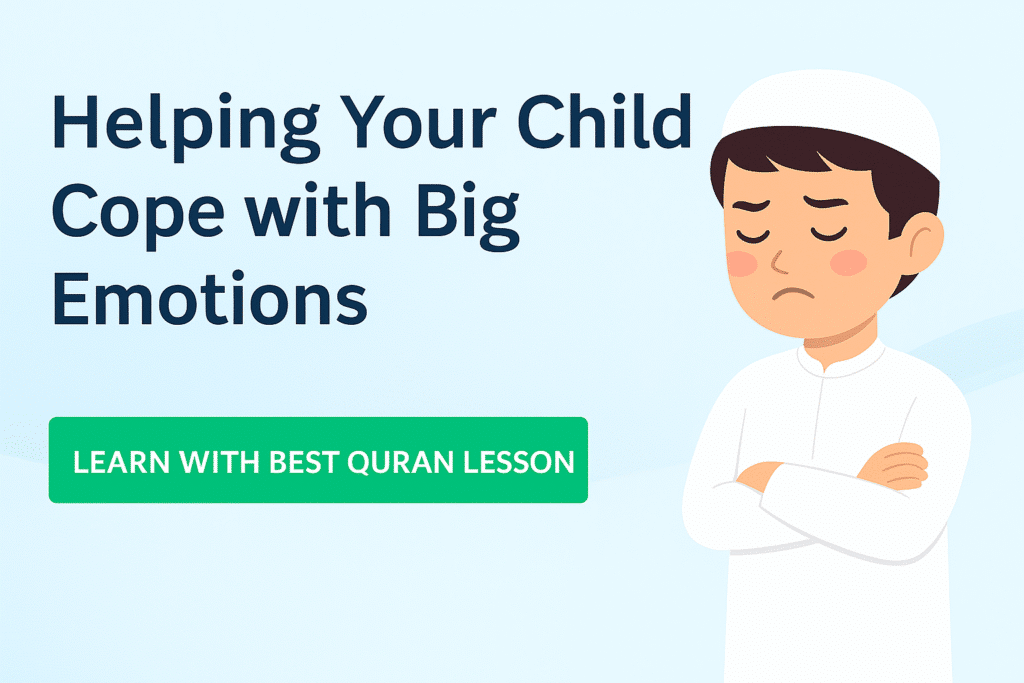Helping Your Child Cope with Big Emotions – A Quranic Parenting Guide

Parenting is a beautiful journey filled with joys, challenges, and countless learning moments. One of the most important aspects of raising children is helping them manage and understand their emotions. Big emotions like anger, sadness, frustration, or even extreme excitement can feel overwhelming for a child. Without proper guidance, these emotions can lead to behavioral issues or internal struggles.
From an Islamic perspective, nurturing emotional intelligence in children is not just a parenting skill—it is part of tarbiyah (upbringing) that shapes their faith, character, and relationships for life. The Quran and Sunnah offer timeless wisdom to guide parents in helping children deal with emotions in a healthy, balanced way.
Why Children Struggle with Big Emotions
Children are still developing the skills to understand and regulate their emotions. They might:
Struggle to identify what they are feeling
React impulsively without considering consequences
Feel misunderstood by adults
Experience stress from changes in their environment
Recognizing these challenges allows parents to approach emotional moments with patience and compassion.
Islamic Guidance on Emotional Nurturing
The Quran encourages patience, compassion, and kindness—qualities essential for emotional guidance. Allah says:
“And lower to them the wing of humility out of mercy…” (Quran 17:24)
The Prophet Muhammad ﷺ also demonstrated remarkable emotional intelligence, showing compassion toward children, validating their feelings, and guiding them with gentleness.
Practical Ways to Help Your Child Cope with Big Emotions
Listen Without Judgement
Give your child space to express themselves without fear of punishment or dismissal.Teach Emotional Vocabulary
Help them name their emotions—”I feel sad,” “I feel angry,” or “I feel proud”—so they can better express themselves.Model Emotional Control
Children learn by watching. Show patience and calmness during challenging situations.Connect Emotions to Faith
Teach them to make dua when feeling upset, recite relevant verses, and remember Allah’s comfort.Encourage Problem-Solving
Instead of focusing only on the feeling, help your child think of positive actions they can take.
The Role of the Quran in Emotional Resilience
Reciting and reflecting on the Quran can bring peace to the heart and clarity to the mind. Surahs like Al-Inshirah (“Verily with hardship comes ease”) remind children that emotions are temporary and manageable with faith.
Integrating daily Quran reading, family discussions about Islamic stories, and reminders of Allah’s mercy can help children find strength and calm during emotional storms.
Conclusion
Helping your child cope with big emotions is an essential part of their growth, both emotionally and spiritually. By combining emotional intelligence strategies with Quranic wisdom, parents can raise children who are resilient, compassionate, and deeply connected to their faith.
For more Islamic parenting tips, visit Best Quran Lesson, where faith meets practical guidance for everyday life.
Search

Wajeeha Arif
Highlighting the virtues of Zil Hajj and Eid al-Adha
Tags

BestQuranLesson.com is a comprehensive online platform dedicated to helping individuals learn the Quran effectively. With qualified instructors, engaging lessons, and flexible learning options.